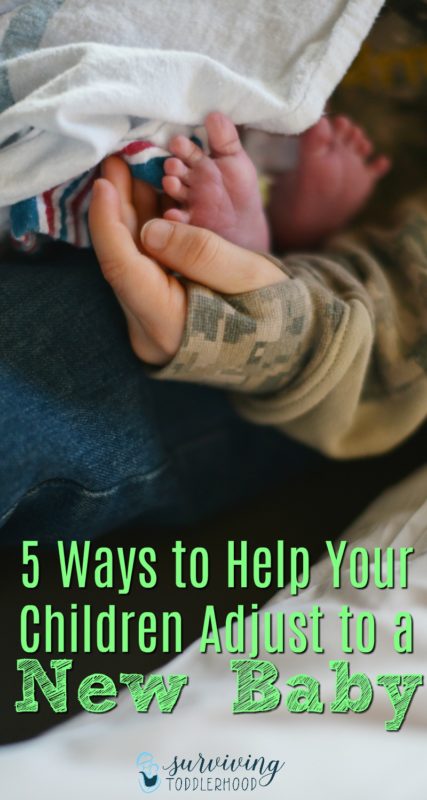5 Ways to Help Your Children Adjust to a New Baby

{This site uses affiliate links. Click here for the full disclosure.}
When the addition of baby number four was approaching I started to worry about how the two year old was going to adjust. My older two boys had done amazingly well when each younger brother was added, but our youngest at the time was definitely more of a mommas boy. We had just stopped nursing a few months earlier, he was moved from the pack and play to a toddler bed AND then to a new room, AND we were in a new brother who would be taking up much of momma’s time throughout the day. I really wanted to help make this transition as easy as possible for him, and though we have had some rough days, I feel like overall it has gone very smoothly for the older boys and wanted to share how we did this with all of you. Here are five ways to help your children adjust to a new baby:

1. Have your littles take a Big Sibling class.
Many hospitals offer Big Sibling classes. Each hospital will have it’s own spin on things, but they will most likely show your children a room where you may be staying when you have the baby, help your older ones change a diaper and learn the correct way to hold a baby, and have short dvd clips on different topics such as: why babies cry, how babies eat, why babies sleep so much, etc.
My boys loved our local Big Sibling class. It may have been because their Nana taught it, but I think they also enjoyed practicing changing diapers and seeing the room where Momma would stay when BabyT4 arrived.
2. Have “baby” get the older ones a small present.
Having baby get the older ones a gift helps to remind the big kids that they are still important and that they are still loved. Worrying that mom and dad don’t love them anymore, or that they won’t have as much time with mom and dad can be a scary thought for littles. So receiving something from the one who is going to steal mom and dad away can help the transition and help remind them that you won’t abandon them for the new baby.
3. Keep some part of your routine the same once you get home.
Whether it is a naptime routine, bedtime routine, or something completely different, keeping some part of your routine the same will help your littles ones as they adjust to having a newborn in the home. We like to keep our bedtime routine the same, not only does it help the older ones, but it can also later help your baby as you start to get them on a evening bedtime schedule. Our bedtime routine includes singing hymns, reading scripture, cuddles, and lots of hugs and kisses.
Bedtime is the hardest on our two year old, he was used to having lots of time to cuddle momma before heading off to bed besides all the other cuddling during the day. His cuddle time at night has been reduced a little, but keeping the routine the same has helped to avoid major meltdowns at bedtime.
4. Create a nursing basket for the older children.
A nursing basket can be a big lifesaver for mommas who have many little ones. This basket is only used when you are busy nursing baby, and because of that keeps its entertainment value high for many months. You can include short dvds, special action figures/baby dolls, color books and crayons, or other craft supplies. The nursing basket will keep your little ones entertained leaving you free to relax a bit more and let the oxytocin flow.
5. Schedule one-on-one time with each child.
While one-on-one time with each child is important at other times, it is especially important during these transition times, whether it is a moving transition, changing schools, losing a friend, and adding another member to the family. These one-on-one dates don’t have to be expensive or extremely long. A trip to the library to pick out books together or the grocery store for a special snack, “tea” time with hot chocolate and lots of whipped cream, reading a book together, and doing a puzzle are a few ideas for you. Make that whatever you do is something that your child wants to do. NOT something that you simply assume that they will enjoy. How often this one-on-one time is may depend on how many children you have, but once a month is a good place to start.

You May Also Like:

6 Ways to Nurture Your Marriage after Baby

7 Tips for Moms Struggling with Postpartum Depression

A Nutritional Guide for Breastfeeding Moms

Leave a Reply